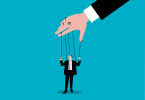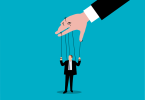7. They Will Have Health Problems and Physical Signs of Psychological Stress.
You may have gained or lost a lot of weight, got serious health problems that you didn’t have before, and seen physical signs of rapid aging. Your cortisol levels have increased as a result of the stress of continuous abuse and your immune system has taken a serious hit, leaving you exposed to physical disease.
You can’t sleep or you may have horrific nightmares when you do, and you’re reliving the trauma through emotional and visual flashbacks that transport you back to the place of the initial wounds.
6. They Develop a Pervasive Sense of Mistrust.
Every person now possesses a threat, and you’re concerned about other people’s motives, especially after witnessing the evil behaviors of someone you formally trusted. Your prudence has turned into anxiety. You’re having a hard time trusting anyone, even yourself because the narcissist has worked so hard to convince you that your experiences were untrue and pointless.
As a result of your constant fear of provoking your abuser in any way, you may avoid confrontation or setting boundaries. You may also apply your people-pleasing behavior outside of the abusive relationship, losing your ability to be free or forceful in the outside world, particularly when dealing with others who resemble or are associated with your abuser and the abuse.
A Book: How To Kill A Narcissist: Debunking The Myth Of Narcissism And Recovering From Narcissistic Abuse
5. They Start Comparing Themselves to Others, to The Point In Blaming Themselves For The Abuse.
A narcissistic abuser is an expert at creating love triangles or bringing another person into the relationship and scaring the victim even more. As a result, victims of narcissistic abuse may internalize the feeling of not being enough and may continually strive for their praise and attention.
Victims may also compare themselves to others who have happier and healthier relationships, or question why their abuser treats random strangers with greater respect. This may lead them down to the trap of, “why me?”, and sink into a pit of self-pity. The truth is that the abuser should be held responsible, you are not to blame for being mistreated.
Continue reading on the next page
Sharing is caring!






